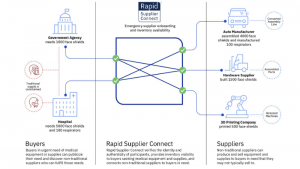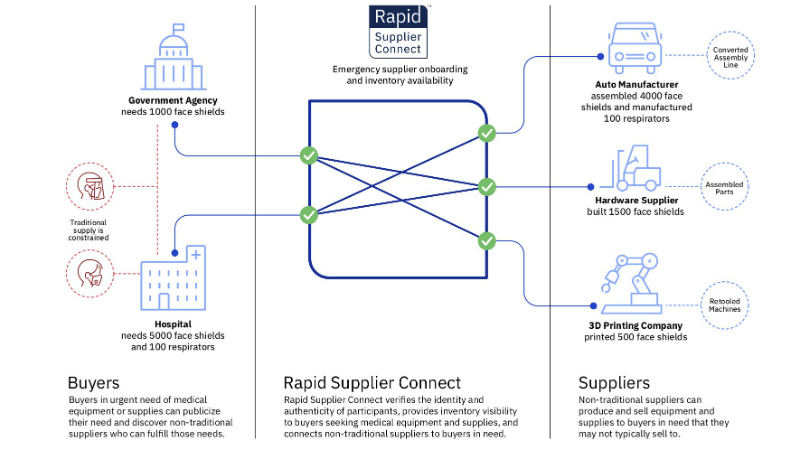
“Northwell Health has had adequate supplies to protect patients and our staff during the increase in New York Covid-19 patient cases,” said Phyllis McCready, vice president and chief procurement officer at Northwell Health.
“It is through creating our own GPOs and supply chain, and joining forces with non-traditional suppliers that we have maintained an adequate stockpile of PPE and other equipment and supplies, so we are pleased to join IBM Rapid Supplier Connect.”
The need for IBM Rapid Supplier Connect
Healthcare workers and other first responders are usually the first to feel the impact of medical equipment supply chains disrupted by the challenges of COVID-19. Yet hospitals and other health care organisations have the responsibility for procuring and then providing medical supplies. They have all found their normal suppliers ‘maxed out’ – not unreasonably when the scale of global demand has leapt since the start of 2020.
To address this unanticipated demand, many large and small businesses from outside the traditional healthcare procurement system are reconfiguring to mass-produce masks, gowns and other essential supplies. In order to purchase from these businesses at scale, buyers — including hospitals, state procurement divisions, pharmacies and others — need assistance to:
- identify these new suppliers.
- understand the inventory available (preferably in near real-time).
- vet and onboard them as accredited suppliers.
- start ordering.
This is the purpose of the IBM Rapid Supplier Connect. The network will also:
- identify existing supplies and excess inventory going unused.
- enable hospitals to make any such excess available to others.
- redirect supplies to where the need is greatest.
How IBM Rapid Supplier Connect will work
Buyers who access the network will benefit from a selection of suppliers broader than their traditional supply chain. With a streamlined supplier onboarding process and validation checks complete, inventory information is available in near-real-time.
Suppliers benefit from:
- a portable online identity.
- access to user feedback.
- the ability to post and manage inventory availability.
Real-time insight into such a volatile and uncertain supply chain is never simple. It is compounded by the challenges of the current global situation caused by COVID-19. To address the need, IBM has harnessed the Trust Your Supplier blockchain-based identity platform built by Chainyard for qualification and identification. This will work in conjunction with IBM’s existing Sterling Supply Chain Suite to deliver a highly scalable ‘Inventory Visibility Microservice’.

It is expected to take buyers and suppliers approximately 30 minutes to join the network. IBM’s operational support center is providing industry and technical support to assist with onboarding and getting value from the network. Suppliers and buyers currently joining the network include hospitals and other organisations – such as Northwell Health, New York’s largest healthcare provider, and The Worldwide Supply Chain Federation. They are onboarding more than 200 American suppliers from a 3,000 global community of members.
Supply chain implications
The IBM Rapid Supplier Connect complements existing supply chain networks and their payment systems. Buyers, however, will have the additional option to use the services of a third-party paymaster – CDAX – for a fee. CDAX, which will hold:
- hold funds made available on behalf of buyers in a custody and settlement account.
- keep goods ordered contractually from a given supplier under a consignment arrangement.
- release funds to the seller, when the buyer verifies acceptance of the order.
Other ‘agents’ contributing to the total process, including:
- Project N95, which is serving as a clearinghouse for information on COVID-related suppliers, will support the supplier vetting.
- Dun & Bradstreet is contributing its identity resolution, firmographic data and supplier risk and viability scoring.
- RapidRatings is providing financial health data on suppliers.
- KYC SiteScan offers its ‘Know Your Business’ due diligence report access.
- Thomson Reuters will provide access to its CLEAR customer due diligence tool.
In combination, these seek to aid buyers by giving access to real-time and comprehensive data to vet suppliers. The objective is to identify potential fraud risks, and then prevent that fraud.
Enterprise Times: what does this mean
The IBM Rapid Supplier Connect solution exploits the IBM Blockchain. Its laudable purpose is to enable healthcare organisations and government agencies to identify and onboard alternative vendors for personal protection equipment and other medical supplies.
Initially, the IBM Rapid Supplier Connect solution will be available at no cost to qualifying buyers and suppliers – but only in the USA and Canada.
Technology solutions with trustworthy information, accelerated discovery, resiliency and adaptation are desirable in medical supply chains stressed by the global impact of COVID-19. The IBM Rapid Supplier Connect would seem to fit the needs. Perhaps most impressive, beyond the exploitation of the Sterling Supply Chain Suite, is how third-party service providers are part of the picture to speed up the vetting, onboarding, ordering and payment functions.


























